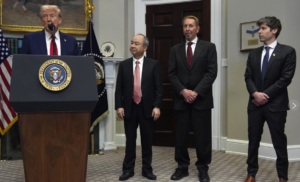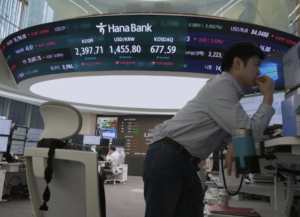U.S. markets dropped on Friday after former President Donald Trump announced potential 50% tariffs on imports from the European Union, set to begin as soon as June 1. The announcement rattled investors and pushed major indexes lower.
As of midday, the S&P 500 had fallen 0.8%, putting it on track for its worst weekly performance in nearly two months. The Dow Jones Industrial Average was down 284 points, or 0.7%, and the Nasdaq slid by 1.1%.
Trump made the tariff threat early Friday on his Truth Social platform, citing a breakdown in trade negotiations with the EU, one of America’s key trading partners. The news sent European markets tumbling, with France’s CAC 40 index losing 1.8%. U.S. stock futures, which had shown a modest outlook earlier, turned negative quickly, with four out of five S&P 500 stocks declining.
Apple shares dropped 2.5% after Trump specifically targeted the tech giant, stating that CEO Tim Cook had been told iPhones sold in the U.S. should be manufactured domestically. Trump warned that Apple would face a 25% tariff if it continued producing its devices overseas.
Trump has previously criticized companies such as Walmart, urging them to absorb the cost of tariffs rather than passing it on to consumers. The uncertainty generated by these tariff threats has made it difficult for businesses to plan effectively.
Deckers Outdoor, the parent company of Hoka and Uggs, was one of several companies citing economic unpredictability. It chose not to issue a full-year forecast, instead offering only quarterly guidance, which fell short of analysts’ expectations. Its stock plummeted 20.3%, despite beating earnings estimates for the past quarter.
Ross Stores also withdrew its annual forecast, noting that over half its merchandise originates in China. CEO Jim Conroy said ongoing high tariffs could erode profits. The company’s profit outlook for the current quarter missed analyst expectations, sending its stock down 13.8%, even as quarterly results exceeded projections.
Conroy highlighted the unpredictability of trade policy and its ripple effects across the economy and corporate profitability.
On the positive side, Intuit saw its stock rise 8.6% after reporting stronger-than-expected quarterly earnings, helped by a robust tax season. The maker of TurboTax and Credit Karma also raised its full-year revenue and profit forecasts, providing a rare bright spot in an otherwise turbulent market.
Wall Street had recently regained much of the ground lost earlier in the trade dispute, with the S&P 500 recovering from a nearly 20% decline. Trump’s earlier move to pause tariffs on several countries, including China, had helped stabilize investor confidence—until now.
In the bond market, U.S. Treasury yields dipped as investors sought safety. The yield on the 10-year Treasury note eased to 4.51% from 4.54% the day before. Earlier in the week, yields had risen on concerns that Washington’s tax cuts could significantly increase government debt, which tends to push interest rates and borrowing costs higher.
Global markets were mixed. Asian markets closed before Trump’s latest comments, with Tokyo’s Nikkei 225 gaining 0.5%, while Shanghai’s index slipped 0.9%.
Meanwhile, the price of gold climbed 1.6%, as investors sought safe-haven assets amid renewed trade tensions and market volatility.














